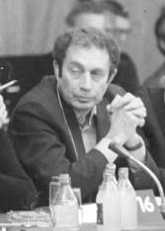Grigory Baklanov
| Grigory Baklanov | |
|---|---|
 | |
| Born |
Grigory Yakovlevich Friedman September 11, 1923 Voronezh, Russian SFSR, USSR |
| Died |
December 23, 2009 (aged 86) Moscow, Russia |
| Nationality | Russian |
Grigory Yakovlevich Baklanov (Russian: Григо́рий Я́ковлевич Бакла́нов) (September 11, 1923 – December 23, 2009) was a Russian novelist and editor, well known for his novels about World War II and as the editor of the literary monthly Znamya during the time of Mikhail Gorbachev's reforms.[1]
Biography
Baklanov was born Grigory Yakovlevich Friedman in Voronezh. From 1941, during the Second World War, he served in the Red Army and was seriously wounded. He was demobilized as an artillery lieutenant in Austria. The war made a lasting impression on him and influenced much of his later literary work. For his war effort, Baklanov was awarded the Order of the Red Star and the Order of the Great Patriotic War, first class.[2]
After demobilization, he attended the Maxim Gorky Literature Institute, from which he graduated in 1951. His first story was published in Krest'yanka, a women's monthly, in the same year.
Baklanov's rise to international fame dates from 1959, with the publication of his novel An Inch of Land (translated as The Foothold, 1962), describing the fate of an ordinary soldier at a bridgehead on the Dnestr in the summer of 1944.
In 1979, his novel, Forever Nineteen, a tribute to his former classmates who died in the war, was published. The success of this novel earned him the USSR State Prize.
In the meantime he had written more novels dealing with the war: The Dead Shouldn't be Shamed (1961) and July 1941 (1964), in which he dealt with the question of the responsibility for the early defeats of the Red Army in 1941.
From 1986 to 1993, during the period of Glasnost, Baklanov was the main editor of the literary magazine Znamya, which published a number of literary works that before had been censored under Stalinism. Baklanov held pro-reform, liberal and pro-Western views. In 1993, Znamya was transformed into a fund.
In 1993, Baklanov was one of the signers of the Letter of Forty-Two, commenting on the events of October 1993 and supporting a ban on communist and nationalist movements.[3]
In 1997, he received the State Prize of the Russian Federation for his novel I togda prikhodyat marodyory (And then came the marauders).
He also wrote the scenarios for a number of films: Poznavaya bely svet (Getting to know the wide world) by Kira Muratova in 1979 and Byl mesyats mai (It was the month of May) by Marlen Khutsiev in 1970.
He died in Moscow on December 23, 2009.
English Translations
- The Foothold, Chapman and Hall, 1962.
- South of the Main Offensive, Dufour Editions, 1963.
- Forever Nineteen, Lippincott Williams & Wilkins, 1989.
- The Moment Between the Past and the Future, Faber and Faber, 1994.
Honours and awards
- Order For Merit to the Fatherland 3rd class
- Order of the Red Star
- Order of the Patriotic War 1st class
- Order of the Red Banner of Labour
- Order of the Badge of Honour
- Order of Friendship of Peoples
- Medal "For Strengthening Military Cooperation"
- Medal "For the Capture of Budapest"
- Medal "For the Capture of Vienna"
- Medal "For the Victory over Germany in the Great Patriotic War 1941–1945"
- State Prize of the USSR
- State Prize of the Russian Federation
References
- ↑ Russian author Grigory Baklanov dies, CBC News, December 23, 2009.
- ↑ Russian writer Grigory Baklanov dies, Vesti, December 23, 2009.
- ↑ "Писатели требуют от правительства решительных действий". Izvestia. 5 October 1993. Retrieved 21 August 2011. (Russian)
|